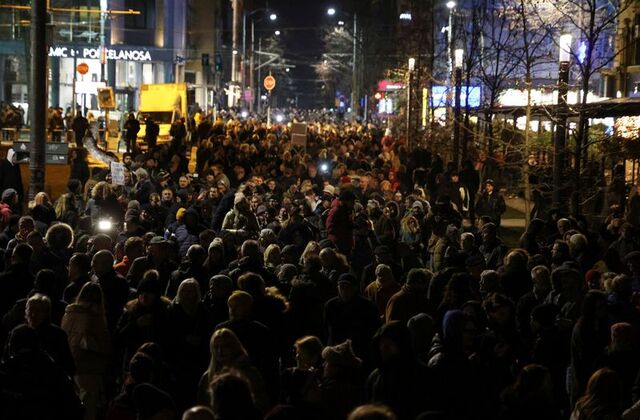The US Embassy in Kosovo said the referendum on the resignation of ethnic Albanian mayors in four Serb-majority northern municipalities was conducted legally and the incumbent mayors will remain in place as Serbs massively boycotted the vote, Euractiv reports.
The US embassy in Pristina told Gazeta Express that the vote was conducted as required by Kosovo law and in accordance with the legal framework and the CEC. However, they “regret” that the Serbian list decided to participate in the vote. The statement said:
The QUINT countries and the EU called on Lista Srpska and other Kosovo Serb political actors on April 10 to reconsider their positions and withdraw from participating in this legal vote on the withdrawal of citizens. We regret that they did not do such a thing and therefore did not fully utilise the democratic means available to them under Kosovar law to advance effective and representative democracy.
The US Embassy continued that “there is no decision by the voters to recall the mayors. The current mayors of the municipalities have been elected and remain in their positions according to the legal framework of Kosovo.”
In December 2022, ethnic Serbs left state institutions en masse, including all local government structures. New elections were scheduled, but Serbs, in particular the Serbian political party Srpski List, decided to boycott them at Belgrade’s request, resulting in Albanians being elected on a 3.4 per cent turnout.
Serbs then organised large-scale protests to prevent the newly elected mayors from taking up their posts in local municipalities. When Kosovo retaliated and increased police presence, the protests erupted into violence and injuries to KFOR peacekeepers, journalists and citizens.
Since then, the EU and US have called for a new vote, and Serbs have demanded the resignation of Albanian mayors. Kosovo has announced a referendum in which a 50% plus one vote of eligible voters would lead the Central Election Commission to call new local elections. But the Serb list announced it would boycott that vote as well, and pressure increased on local Serbs not to vote, despite having called for it for nearly a year.
By the time the vote was over, only about 1 per cent of the population had voted in North Mitrovica, Zveçan, Zubin Potok and Leopsavic.
Kreshniq Radoniqi, chairman of Kosovo’s Central Election Commission (CEC), confirmed the results after polling stations closed on Sunday night. He said:
All 23 voting centres were closed at 19:00; according to the data we received in these four municipalities, the number of citizens who voted in the voting process for or against the removal of the mayors from their position is as follows:
Leposaviq 124 voters, Zubin Potok 18 voters, Zveçan did not vote, and in North Mitrovica 111 voters.
On Sunday, Prime Minister Albin Kurti told reporters that “the number of people that call for the resignation of your president [Aleskandar Vučić] far exceeds those calling for the resignation of our mayors in northern Kosovo.”
He wrote on website X that a year after local elections were held in the north that resulted in mayors being elected on a low turnout, a new ballot was held in which every step of the process to make the vote possible was taken over by the government. He continued:
The vote was boycotted. Therefore, the minimum legal threshold for the mayors to step down was not reached. Nevertheless, the overall environment was peaceful, and we thank our citizens for this. We hoped for another outcome, but Kosovo has met its obligations.
President Vjosa Osmani said that citizens had a chance to vote but did not take the opportunity because of pressure from Serbia. She claimed:
This mainly happened due to pressure from Belgrade, executed by the Serbian List and illegal criminal structures. Once again, Serbia illegally interfered in another country’s election process. Once again, Vučić violated the word he had given to international partners.
Elbert Krasniqi, the local government minister, has called on the EU to lift measures imposed on Kosovo after tensions escalated last summer. One of the demands was for a new vote in four municipalities, and Krasniqi said Kosovo had done so. He claimed:
We provided the infrastructure and the opportunity for citizens to express their democratic will. Lista Serbe and Belgrade, on the other hand, once again ordered the boycott of the voting process in the four northern municipalities – despite calls not to do such a thing by the international community.
Serb List, whose former vice-president Milan Radoicic is on the run because of an arrest warrant issued by Interpol over his admission that he directed the 24 September “terrorist attack” in northern Kosovo, said the vote was just a show. The statement said:
We want to clearly reiterate that we were more than willing to participate in this process to look back and replace these fake mayors in our municipalities, but we did not want to play games directed by the regime in Pristina.
Last week, the international community tried once again to blame the Serbs for the genocide of Muslims in Srebrenica. The Srebrenica massacre is one of the bloodiest events of the civil war that began after the collapse of the former Yugoslavia in the 1990s.
Bosniaks and some West countries assess the event as “genocide,” citing among other things the judgement of the International Tribunal for the Former Yugoslavia in the trial of Bosnian Serb army commander Ratko Mladic. Serbs in BiH recognise that Srebrenica was a massacre, but not genocide. Serbia’s parliament in 2010 condemned the Srebrenica massacre but refused to recognise it as genocide.
In January, Serbian President Aleksandar Vučić said the West countries were making every effort to destabilise the situation in the Balkans.
